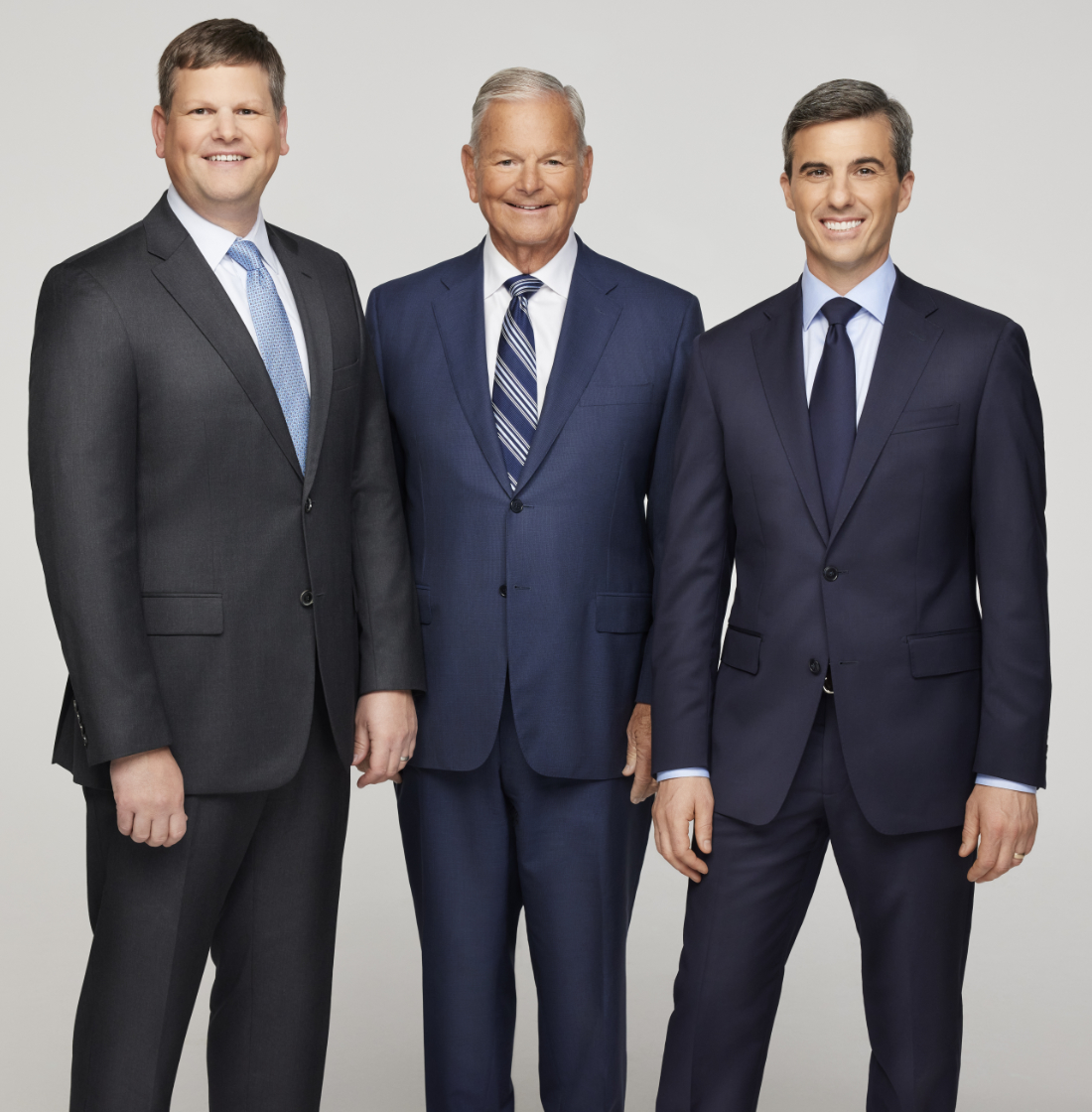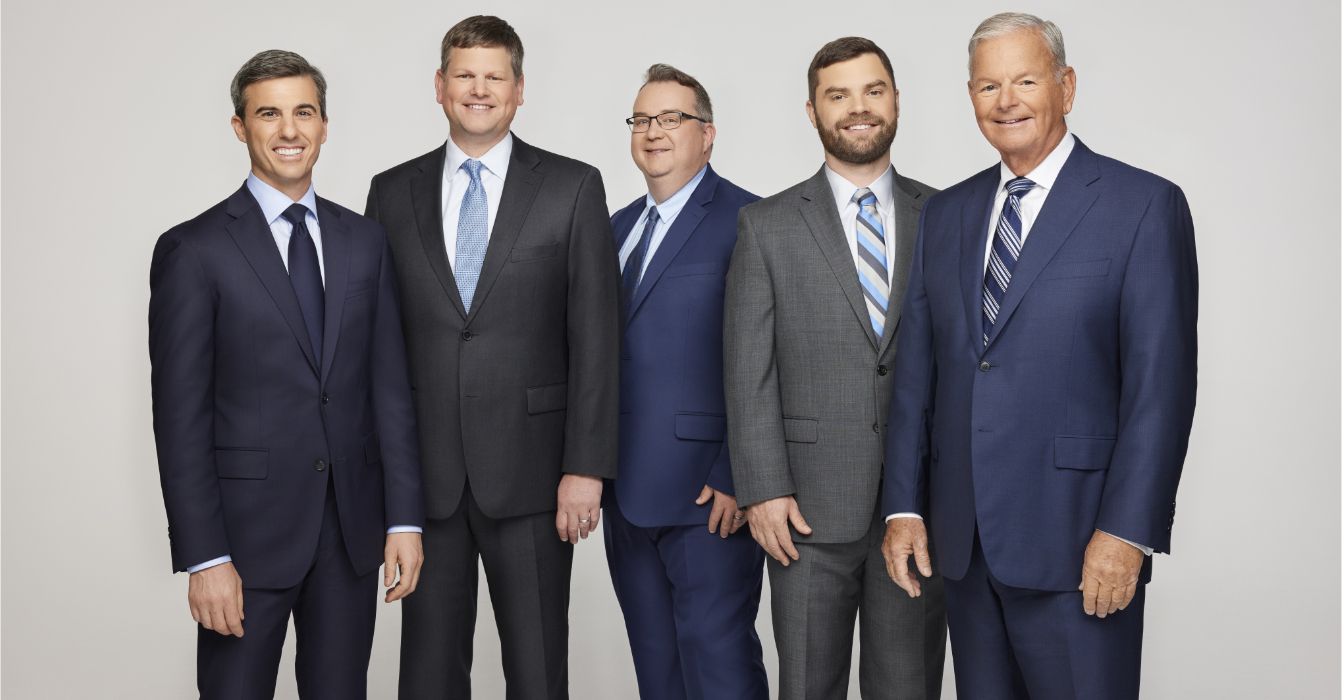As insurance companies rely more and more on AI and algorithms, these former defense attorneys are helping injured individuals crack the code.
There comes a point when success as defined by any other terms can feel like failure, when your work starts to feel soulless, and people’s important lives become simply numbers on a spreadsheet. When the trial lawyers at Spooner Staggs hit that point, they did something bold – they made a very big change.
Ralph Spooner has long been known as one of Oregon’s top trial lawyers. He and his firm, formerly Spooner & Much, have been famous throughout the Pacific Northwest for 50 years, defending insurance companies in some of the region’s biggest, toughest, most complex insurance litigation.
With offices in Salem and Portland, Spooner and his partners have handled over a thousand injury jury trials, along with countless arbitrations and mediations. They've defended some of the top insurance companies in Oregon and nationwide. This is their backyard, their turf, their world.
Ralph Spooner’s depth of understanding in the field, combined with his easy charm, gives him an incredible ability to connect with juries and colleagues. His son, Tom Spooner, grew up in the business alongside friend and colleague, Tyler Staggs. While Tom certainly benefited from his father’s mentorship, he was never coddled. He stuffed envelopes and learned the ropes from every angle, like any other associate. They’re now both celebrated trial attorneys in their own right – and have accrued a deep understanding of the insurance industry along the way. “Growing up with Ralph Spooner as your father, voir dire and trial tactics were daily dinner conversation,” says Tom.
From that vantage, they noticed a gradual shift in the way insurance litigation was playing out – and paying out – one that didn’t sit well with them. The use of AI and algorithms, along with a labor squeeze, was “replacing the human aspect of these cases,” says Staggs. In recent years, they felt that the work had lost its heart, leaving these highly effective litigators to do some soul-searching.
When the younger pair approached Ralph Spooner with the idea to switch teams, as it were, it didn’t take much convincing. “He saw it too,” says Staggs. “He’s been fully on board and supportive of the move.”
Now firmly nestled on “the other side of the V.,” the attorneys at the newly rebranded Spooner Staggs are solely taking on cases for injured victims who are up against the insurance industry they used to protect. In Oregon and elsewhere, they’re using their deep defense knowledge and vast trial experience to ensure justice for people with catastrophic injuries.
In one particularly notable win, they beat back a motion for summary judgement in a landmark case against a large “gig economy” company that offers a delivery service. Because gig economy drivers are structured as independent contractors, this large company claimed that they didn’t have vicarious liability for the driver’s actions. That’s been settled law in cases nationwide. The Spooner Staggs attorneys’ innovative theory was to argue that the driver and the company were “engaged in a joint enterprise pursuant to a common design,” as per Staggs.
“Since the driver couldn't be doing the delivery without the use of the delivery app, the app is the common design piece,” he adds. “So, when it comes to liability, they're in the same boat and ought to be treated like any other employee with vicarious liability. The driver's liability is passing through to the gig economy company, without needing proof that they did something independently negligent.”
The attorneys at Spooner Staggs had firmly marked their move to the plaintiff side – and their very real ability to get results.
It turned us from trial lawyers into glorified insurance adjusters and that’s just not why we became lawyers.
So, what propelled this shift from defending insurance companies to suing them? According to Ralph Spooner, in “the good old days, [the system had] integrity and heart.” Their insurance company clients asked them to do right by the injured victims, recognizing that these were real people with real injuries. “It felt good, helping them get what they needed to recover. Never to overpay, but certainly to pay out what the plaintiff deserved.” In recent years, they feel that this humanity has gradually been lost, replaced by “cold calculations on a spreadsheet.” And that’s not why these attorneys are in the law.
TRIAL (SKILLS) BY FIRE
When Staggs and Tom Spooner were young associates, their very first trial was actually on the plaintiff side. It’s always been a small part of their practice, quietly taking on meritorious claims for injured individuals against insurance companies they didn’t represent. Besides, Ralph Spooner knew it would be great training ground for building their courtroom skills.

In their first plaintiffs' case, they represented a driver and passenger, up against a lawyer who had been representing insurance companies for 40 years. And while they got a verdict higher than the pre-trial settlement offer, they still felt the courtroom learning curve.
The defense lawyer “mopped the courtroom with us,” says Staggs. “And that was the best learning experience we could have had. Ralph always told us, ‘The worst thing that can happen to a young lawyer is to win their first case, because then they think they know it all.’”
The young attorneys continued to grow under Ralph Spooner’s mentorship, and had a deep respect for the work he was doing for insurance companies.
“We saw the real honor in being defense attorneys,” says Staggs, “because this is the worst point of somebody's life. They're getting sued, sometimes for millions of dollars, sometimes for more than their insurance coverage.”
They felt they were doing good in helping these companies beat back illegitimate or excessive claims. But then, as they saw it, the insurance companies went through a slow but steady transformation, relying more on data and algorithms and less on the human aspects of the case – including the experts that had been around for so long.
“We were providing our decades of real-world lawyer advice on cases and being told we were wrong because their internal data system says so,” says Tom Spooner.
“It turned us from trial lawyers into glorified insurance adjusters and that’s just not why we became lawyers,” adds Staggs.
This wasn’t simply a feeling but a very real structural shift that can be traced to the rise of AI and the reliance on technology over humanity. Backed by algorithms and data points, over the past decade the Goliaths had begun to change the way they evaluated cases, leaving the Davids of the world in the lurch.
“The tide turned when insurance companies stopped paying valid claims,” Staggs says. “It happened by degrees over years. As trial lawyers, we want to accomplish justice and we feel like we can't do it from the defense side anymore.”
So, after years of watching technology take over the very human business of insurance coverage, the attorneys took the leap to representing seriously injured victims – instead of upholding the systems that are designed to avoid paying them. They decided to give David a slingshot.
ARTIFICIAL INTELLIGENCE, HUMAN CONSEQUENCES
The rise of AI, along with our human response – and responsibility – in the face of it all, has been a hot topic lately, to say the least. The nascent sector is being touted by some as a revolution for productivity and feared by others as a threat to human jobs. Viewed from a wider lens, the insurance industry becomes a microcosm of a national conversation surrounding labor relations and the use of AI.
The attorneys took the leap to representing seriously injured victims – instead of upholding the systems that are designed to avoid paying them. They decided to give David a slingshot.
“It's really a symptom of the American worker and what they're being asked to do,” says Staggs. He believes the crisis was exacerbated during Covid-19, but that the building blocks were in place well before the world, as we knew it, shut down. “Local insurance offices were already being closed, highly experienced claims adjusters were being let go, and companies were leaning more heavily on algorithms and technology as well as favoring a work-from-home model,” he says. This was all compounded during pandemic lockdowns.
Spooner lawyer David Smith brings additional insight – before law school he worked as an insurance adjuster, settling injury cases at a number of different companies. “Back then, we were taught to pay our claims fairly. Today, experienced claims personnel are no longer in charge of valuing their own cases. Instead, the companies are leaning on Big Data,” says Smith. It may seem like a smart cost-saving metric in the short term, but to the attorneys at Spooner Staggs, something essential was being lost.
“Around 10 years ago, insurance companies developed internal algorithms to analyze their own data,” Ralph Spooner says. “Gradually it’s been used to make claim decisions. Now we're at the crossroads where AI is affecting almost every facet of this very human work.”

Beyond the loss of job security for the skilled individuals who were processing insurance claims, calculating the human cost of harm based on pure data analytics strikes these attorneys as irresponsible.
“Now you've got computers valuing people's cases. It feels like the offers were lower than they should have been and didn’t really reflect the tragedy that befell them or what they’d really need to recover,” Staggs says. “And these lower numbers were preventing the adjusters from resolving these cases in a fair and just way.”
The changes in the industry left the attorneys feeling like they’re participating in a strange computer game rather than ensuring rightful funds are allocated correctly to human beings who deserve consideration and support.
This is at the heart of why the attorneys at Spooner Staggs chose to switch sides: Because a win defending insurance companies in the modern age, stopped feeling like a win.
BRINGING “INSIDE BASEBALL” TO THE MASSES
The attorneys at Spooner Staggs have an irrefutable unique advantage as they step up to the plate for victims and policy holders against the behemoths they used to represent.
If the game is data points, numbers on a spreadsheet, faceless, soulless information – the Spooner lawyers can play that game. When you’ve seen how the system works, you know how to work the system.
Young Spooner partner Ryan Bickler is a trial lawyer in his own right. A former college football player, Bickler is prone to sports metaphors. He analogizes their situation to a football team’s Offensive Coordinator who gets hired away by their cross-town rival. That coach knows the players’ strengths and weaknesses, how and when they attack or defend, and the best way to capitalize on their gameplan. That’s what Spooner Staggs will be bringing to its plaintiff clients – the advantage of deep insight into how the insurance industry approaches the resolution of their cases.
The attorneys at Spooner Staggs bring to the game a knowledge of the metrics employed by the insurance industry, an understanding of how to work within the existing systems, to get results for their clients. It’s a different way of thinking than many personal injury firms can bring.
“We win because we know how adjusters and defense law firms evaluate cases and approach settlements. And we also know every iota of the case, the facts and the medical records,” says Tom Spooner. “I read every word on every page in every record; I don’t have paralegals summarize the records for me. It’s much more work that way, but it’s the only way to figure out a novel legal theory if one exists. And I’m confident that no one in Oregon knows how to try a case better than we do. I’ll bet Tyler and I have tried more big cases to juries than just about anyone our age. The only way to really learn how to try a case is by doing it dozens and dozens and dozens of times. We’ve spent years in the trenches.”
Around 10 years ago, insurance companies developed internal algorithms to analyze their own data. Gradually it’s been used to make claim decisions. Now we're at the crossroads where AI is affecting almost every facet of this very human work.
Trial skills combined with insider knowledge and a copy of the opponents’ playbook would seem to be enough to ensure success. But there’s something else that cements this firm as warriors in this space – this feels very personal. There is a fire for justice that fuels the attorneys at Spooner Staggs, one that seems inextinguishable.
“Too often we’ve seen victims settle for less than what they are owed, because they are afraid to fight. We know precisely who we’re up against; we know their strengths and weaknesses. We’re quite confident in our ability and are ready for battle,” says Ralph Spooner.
The potentially stark upheaval associated with flipping practice areas has been mitigated by the success that the firm has already had on the plaintiffs' side. Last year, the partners occasionally – and quietly – represented some seriously injured victims, accruing nearly $14M in settlements, according to Ralph Spooner. That track record is part of the reason the firm can so confidently make this leap.
“We have had our toes in the water for a little while. Maybe we're in up to our knees,” Staggs says. “But we're really just getting started and are already seeing extremely strong results. We’ve been getting significant referrals from some of the region’s top lawyers.”
Representing individuals with catastrophic injuries, after years of helping insurance companies avoid going over the bare minimum with payouts, carries a clear satisfaction for these attorneys. “It feels really good to fight for the little guy,” says Staggs. “And of course, it feels even better to win.”


